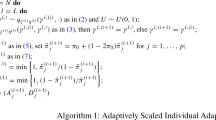Abstract
A Monte Carlo algorithm is said to be adaptive if it automatically calibrates its current proposal distribution using past simulations. The choice of the parametric family that defines the set of proposal distributions is critical for good performance. In this paper, we present such a parametric family for adaptive sampling on high dimensional binary spaces.
A practical motivation for this problem is variable selection in a linear regression context. We want to sample from a Bayesian posterior distribution on the model space using an appropriate version of Sequential Monte Carlo.
Raw versions of Sequential Monte Carlo are easily implemented using binary vectors with independent components. For high dimensional problems, however, these simple proposals do not yield satisfactory results. The key to an efficient adaptive algorithm are binary parametric families which take correlations into account, analogously to the multivariate normal distribution on continuous spaces.
We provide a review of models for binary data and make one of them work in the context of Sequential Monte Carlo sampling. Computational studies on real life data with about a hundred covariates suggest that, on difficult instances, our Sequential Monte Carlo approach clearly outperforms standard techniques based on Markov chain exploration.
Similar content being viewed by others
References
Albert, A., Anderson, J.A.: On the existence of maximum likelihood estimates in logistic regression models. Biometrika 72, 1–10 (1984)
Andrieu, C., Thoms, J.: A tutorial on adaptive MCMC. Stat. Comput. 18(4), 343–373 (2008)
Bahadur, R.: A representation of the joint distribution of responses to n dichotomous items. In: Solomon, H. (ed.) Studies in Item Analysis and Prediction, pp. 158–168. Stanford University Press, Stanford (1961)
Bottolo, L., Richardson, S.: Evolutionary stochastic search for Bayesian model exploration. Bayesian Anal. 5(3), 583–618 (2010)
Cappé, O., Douc, R., Guillin, A., Marin, J., Robert, C.: Adaptive importance sampling in general mixture classes. Stat. Comput. 18(4), 447–459 (2008)
Carpenter, J., Clifford, P., Fearnhead, P.: Improved Particle Filter for nonlinear problems. IEE Proc. Radar Sonar Navig. 146(1), 2–7 (1999)
Chopin, N.: A sequential particle filter method for static models. Biometrika 89(3), 539 (2002)
Clyde, M., Parmigiani, G.: Protein construct storage: Bayesian variable selection and prediction with mixtures. J. Biopharm. Stat. 8(3), 431 (1998)
Clyde, M., Ghosh, J., Littman, M.: Bayesian adaptive sampling for variable selection and model averaging. J. Comput. Graph. Stat. 20(1), 80–101 (2011)
Cox, D.: The analysis of multivariate binary data. Appl. Stat. 113–120 (1972)
Cox, D., Wermuth, N.: A note on the quadratic exponential binary distribution. Biometrika 81(2), 403–408 (1994)
Cox, D., Wermuth, N.: On some models for multivariate binary variables parallel in complexity with the multivariate Gaussian distribution. Biometrika 89(2), 462 (2002)
Del Moral, P., Doucet, A., Jasra, A.: Sequential Monte Carlo samplers. J. R. Stat. Soc., Ser. B, Stat. Methodol. 68(3), 411–436 (2006)
Dongarra, J., Moler, C., Bunch, J., Stewart, G.: LINPACK: Users’ Guide. Society for Industrial and Applied Mathematics, Philadelphia (1979)
Emrich, L., Piedmonte, M.: A method for generating high dimensional multivariate binary variates. Am. Stat. 45, 302–304 (1991)
Fearnhead, P., Clifford, P.: Online inference for hidden Markov models via particle filters. J. R. Stat. Soc., Ser. B, Stat. Methodol. 65(4), 887–899 (2003)
Firth, D.: Bias reduction of maximum likelihood estimates. Biometrika 80, 27–38 (1993)
Gelman, A., Meng, X.: Simulating normalizing constants: From importance sampling to bridge sampling to path sampling. Stat. Sci. 13(2), 163–185 (1998)
Genest, C., Neslehova, J.: A primer on copulas for count data. ASTIN Bull. 37(2), 475 (2007)
George, E.I., McCulloch, R.E.: Approaches for Bayesian variable selection. Stat. Sin. 7, 339–373 (1997)
Gilks, W., Berzuini, C.: Following a moving target Monte Carlo inference for dynamic Bayesian models. J. R. Stat. Soc., Ser. B, Stat. Methodol. 63(1), 127–146 (2001)
Gordon, N.J., Salmond, D.J., Smith, A.F.M.: Novel approach to nonlinear/non-Gaussian Bayesian state estimation. IEE Proc. Radar Sonar Navig. 140(2), 107–113 (1993)
Harrison, D., Rubinfeld, D.L.: Hedonic housing prices and the demand for clean air. J. Environ. Econ. Manag. 5(1), 81–102 (1978)
Jasra, A., Stephens, D., Doucet, A., Tsagaris, T.: Inference for Lévy-Driven stochastic volatility models via adaptive sequential Monte Carlo. Scand. J. Stat. (2008)
Joe, H.: Families of m-variate distributions with given margins and m (m−1)/2 bivariate dependence parameters. Lect. Notes Monogr. Ser. 28, 120–141 (1996)
Kitagawa, G.: Monte Carlo filter and smoother for non-Gaussian nonlinear state space models. J. Comput. Graph. Stat. 5(1), 1–25 (1996)
Kong, A., Liu, J.S., Wong, W.H.: Sequential imputation and Bayesian missing data problems. J. Am. Stat. Assoc. 89, 278–288 (1994)
Lee, A.: Generating random binary deviates having fixed marginal distributions and specified degrees of association. Am. Stat. 47(3) (1993)
Lee, A., Yau, C., Giles, M., Doucet, A., Holmes, C.: On the utility of graphics cards to perform massively parallel simulation of advanced Monte Carlo methods. J. Comput. Graph. Stat. 19(4), 769–789 (2010)
Leisch, F., Weingessel, A., Hornik, K.: On the generation of correlated artificial binary data. Technical report, WU Vienna University of Economics and Business (1998)
Liang, F., Wong, W.: Evolutionary Monte Carlo: Applications to Cp model sampling and change point problem. Stat. Sin. 10(2), 317–342 (2000)
Liu, J.: Peskun’s theorem and a modified discrete-state Gibbs sampler. Biometrika 83(3), 681–682 (1996)
Liu, J., Chen, R.: Sequential Monte Carlo methods for dynamic systems. J. Am. Stat. Assoc. 93(443), 1032–1044 (1998)
Lunn, A., Davies, S.: A note on generating correlated binary variables. Biometrika 85(2), 487–490 (1998)
Neal, R.: Annealed importance sampling. Stat. Comput. 11(2), 125–139 (2001)
Nelsen, R.: An Introduction to Copulas. Springer, Berlin (2006)
Nott, D., Kohn, R.: Adaptive sampling for Bayesian variable selection. Biometrika 92(4), 747 (2005)
Oman, S., Zucker, D.: Modelling and generating correlated binary variables. Biometrika 88(1), 287 (2001)
Park, C., Park, T., Shin, D.: A simple method for generating correlated binary variates. Am. Stat. 50(4) (1996)
Qaqish, B.: A family of multivariate binary distributions for simulating correlated binary variables with specified marginal means and correlations. Biometrika 90(2), 455 (2003)
Robert, C., Casella, G.: Monte Carlo Statistical Methods. Springer, Berlin (2004)
Schäfer, C.: Parametric families on large binary spaces. Technical report, Centre de Recherche en Economie et en Statistique, Paris (2011)
Schwarz, G.: Estimating the dimension of a model. Ann. Stat. 6, 461–464 (1978)
Suchard, M., Holmes, C., West, M.: Some of the what?, why?, how?, who? and where? of graphics processing unit computing for Bayesian analysis. In: Bernardo, J.M. (ed.) Bayesian Statistics, vol. 9. Oxford University Press, London (2010)
Tibshirani, R.: Regression shrinkage and selection via the lasso. J. R. Stat. Soc., Ser. B, Methodol. 58(1), 267–288 (1996)
Yeh, I.: Modeling of strength of high-performance concrete using artificial neural networks. Cem. Concr. Res. 28(12), 1797–1808 (1998)
Author information
Authors and Affiliations
Corresponding author
Rights and permissions
About this article
Cite this article
Schäfer, C., Chopin, N. Sequential Monte Carlo on large binary sampling spaces. Stat Comput 23, 163–184 (2013). https://doi.org/10.1007/s11222-011-9299-z
Received:
Accepted:
Published:
Issue Date:
DOI: https://doi.org/10.1007/s11222-011-9299-z




